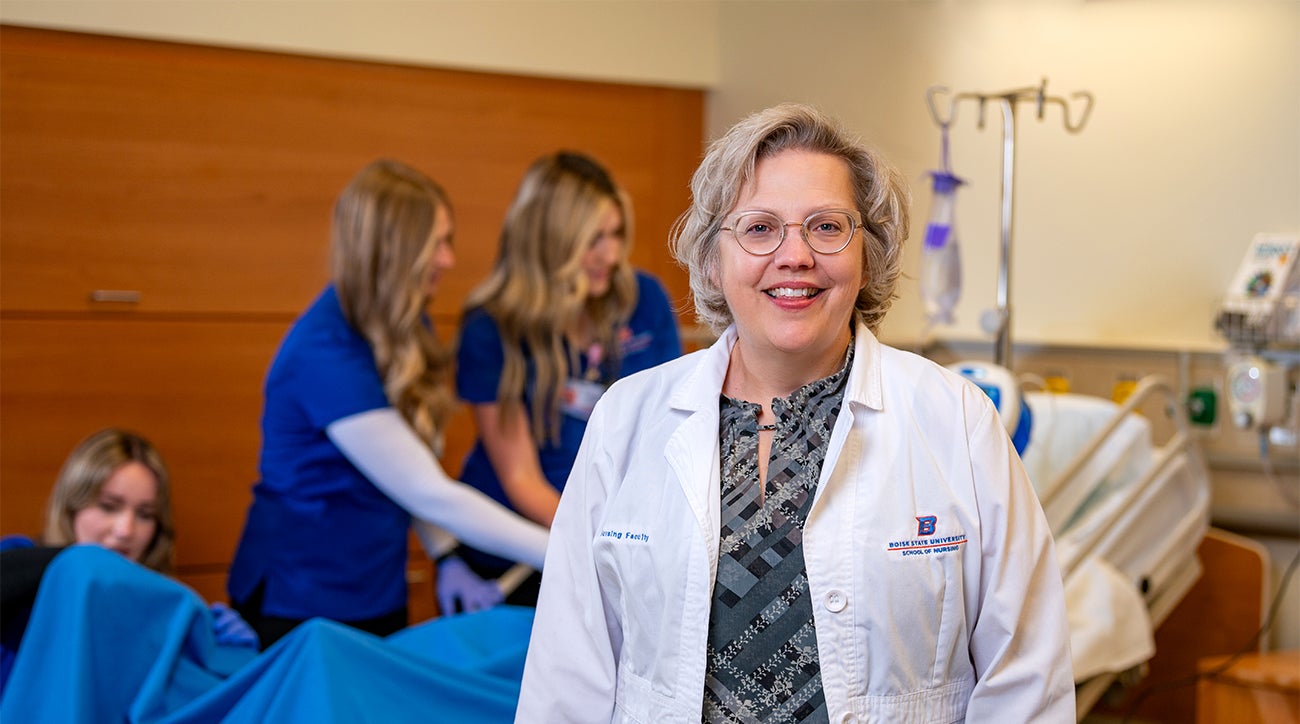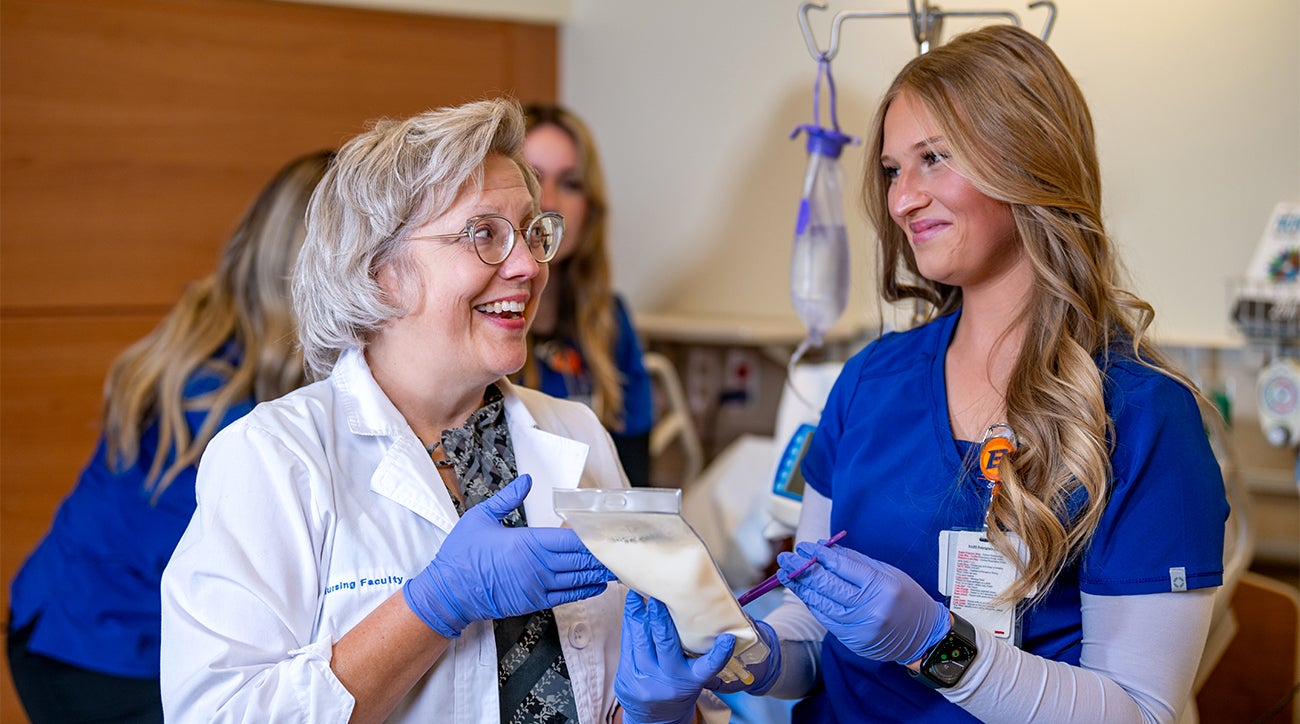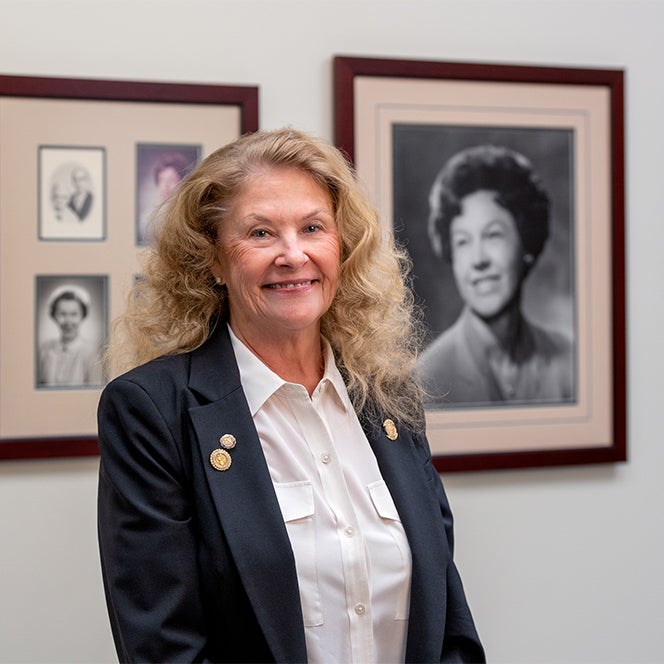
Amy Spurlock, chief nurse administrator and associate divisional dean in the School of Nursing, will become the JoAnna “Jody” DeMeyer Endowed Chair in Nursing in August 2024. Like the late Jody DeMeyer, Spurlock is a staunch advocate for nursing education. She has been a nurse for 33 years and has spent 30 of those as an educator.
With her new appointment, Spurlock said she wants to raise the visibility of research and scholarly works in the School of Nursing. She wishes to promote a culture that emphasizes student success and trains “safe and competent graduates who will go out and improve the health and clinical outcomes for their patients.”
“I hope to make Jody’s family proud,” she added.
A Virginia native, Spurlock followed her mother into the nursing profession. She recalls the crisp white cap her mother wore to work. When she was a child, Spurlock crafted her own pretend cap from an upside-down Kleenex box.
“My mother was an early adopter of the baccalaureate in nursing,” Spurlock said. “She graduated in 1964 at a time when many nurses were educated in diploma programs. A college degree wasn’t as common. But my grandfather said, ‘If you’re going to be a nurse, you’re going to be a well-educated nurse.’” Spurlock became one as well. After teaching at Boise State in the 1990s, she earned her doctoral degree at the University of Kentucky and taught at Troy University in Troy, Alabama. She returned to Boise State in 2021 as a tenured professor and soon became associate divisional dean.
A revolution in plain sight

Spurlock’s research benefits patients who rely on feeding tubes for their nutritional needs. Since the 1940s, feeding tubes have provided nutrition through a formula of corn syrup, dairy products and amino acids.
“The drawback is that because this is not ‘real food,’ people can have adverse reactions. The very thing meant to sustain a person becomes a problem,” Spurlock said.
Over the past 10 years, more caregivers have embraced blended tube feeding, or blending up whole foods for patients rather than relying on formula. While formula remains the best solution for some, many others have better outcomes with whole foods.
Spurlock has published research in academic journals and books and has presented it nationally and internationally on various topics. But she is most proud, she said, of her 10 publications on blended tube feeding. Spurlock’s stepdaughter, Sarah Spurlock, had special needs and relied on a feeding tube. She died 19 years ago, a day before her 17th birthday, partly because of a feeding tube complication.
“It always haunted me, how I could have made things better for her,” Spurlock said. At the time of Sarah’s death, blended tube feeding was not common. Spurlock learned about it from a colleague who shared the story of a frustrated parent who poured blended green beans into her son’s feeding tube and he began to thrive.
“This doesn’t sound like rocket science, but at the time it kind of was,” Spurlock said. “We weren’t the first to work with blended tube feeding, but we were among the first to start publishing about it. And now it’s caught fire.”
A decade ago, when Spurlock and her colleagues first surveyed registered dietitians about blended tube feeding, only 58% recommended or used it. Today, that number has risen to between 73% and 95%. The pharmaceutical industry has evolved, too, developing many food-based products for tube feeding, including one that is 100% whole food.
The right combination for Boise State and for Idaho
Dean of Health Sciences Tim Dunnagan noted Boise State’s Blueprint for Success – the university’s set of guiding principles – and its emphasis on research and community partnerships.
“Hiring someone like Amy and putting her in this position enables us to deepen that environment,” Dunnagan said. “She brings a level of knowledge and confidence paired with an approachable personality. This allows people to make connections, to think of ways they can broaden their own research and see how research is supported at Boise State.”
Dunnagan said he looks forward to Spurlock building new partnerships with state and federal agencies, creating “a synergy” among healthcare organizations and enlisting the power of academic research to solve real Idaho problems.
Amy Spurlock is part of a Boise State family. Her husband, Jeff Spurlock, retired as a Professor Emeritus from Troy University. He teaches in Boise State’s Department of Media.
Who was Jody DeMeyer?
JoAnna “Jody” DeMeyer was born in Boise in 1929. Treasure Valley residents might recognize her name from the DeMeyer Furniture chain and DeMeyer Park in West Boise, built on land she donated. DeMeyer began her nursing career in Oregon in the early 1950s but soon returned to Idaho as a nursing instructor at St. Luke’s Hospital. When Boise State, then Boise Junior College, established its Department of Nursing in 1955, DeMeyer was among its first faculty members. In the 1970s, following her graduate studies and time as a professor of nursing at the University of California San Francisco, she returned to St. Luke’s, ending her career as vice president for patient care services. She built partnerships among local hospitals to create and fund continuing education classes for registered nurses.

Kirsten Coughlin, a retired registered nurse, knew DeMeyer well. “Jody was all about education,” Coughlin said. “She would have loved to see all nurses have at least a baccalaureate degree.”
In 1988, DeMeyer gathered educators, business leaders and healthcare professionals to form Boise State’s Friends of Nursing. The group raised millions for nursing education. A longtime diabetic, DeMeyer helped establish the Humphreys Diabetes Center in Boise and served on its board. DeMeyer died in 2004. Her $3 million gift established the endowed chair bearing her name – one of Boise State’s first fully funded endowed chairs – in 2006.
Coughlin said that DeMeyer was simultaneously a gifted caregiver and a smart businesswoman. She was quiet about her family’s wealth but had a keen sense of how the private sector could support the public good. DeMeyer dressed elegantly and enjoyed a glass of fine Kentucky Bourbon. She could be intimidating, Coughlin said. That belied a “heart of gold” and an unfailing empathy toward her patients, students and colleagues.
Coughlin is also a generous donor to Boise State. She established the Margaret Graham Iseli Nursing Endowment for Idaho students in honor of her mother, an Army nurse who served in World War II in France and North Africa.
“I didn’t want money to keep someone with the heart of a caregiver from becoming a nurse,” Coughlin said.
By Anna Webb